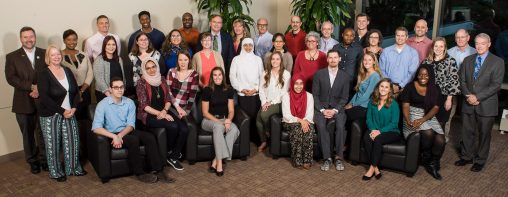Many take for granted one of the most basic determinants of health: access to affordable and convenient transportation. The cost and time required for daily travel between work, home, school, daycare, the grocery store and other places have great impacts on the quality of life for everyone.
For those working in public health, convenient transportation plays a crucial role. It is the focus of ongoing work in Springdale, Ohio, led by Health Commissioner and Wright State University Master of Public Health student Matt Clayton.
He takes classes part-time as he is busy running a health department and has learned new public health skills through the various competencies covered in his courses. The Master of Public Health Program at the Wright State University Boonshoft School of Medicine also has helped connect Clayton with collaborators who are aiding his efforts to improve public transportation in Springdale.
“A robust, affordable, and reliable transit system means better access to education and jobs, recreational and after-school activities, healthier food options, health care facilities, as well as friends and family,” said Sara Paton, director of the Master of Public Health Program and associate professor of population and public health sciences.
Clayton received guidance on gathering transportation data from Paton. For expertise in health communication, he turned to Jessica Saunders, adjunct assistant professor in the Department of Pediatrics and the Department of Population and Public Health Sciences. With their insight, Clayton is working to alleviate the lack of public transportation in disadvantaged parts of his city.
“The initiative to increase public transportation in areas of poverty is rooted in service to those affected by health inequity and social inequality. In reality, successfully completing this initiative would not just provide benefits to underserved populations,” Clayton said. “Increased public transportation would also bring social and economic benefits for the larger community and the business sector.”
Springdale, like other parts of Hamilton County, has limited public transportation options that coincide with areas of concentrated disadvantage and high poverty rates among residents. Improving transportation options there could provide better access while also benefiting people in surrounding communities.
Clayton is working toward a long-term solution for the lack of transportation, and it’s not certain what that will look like. The need for funding transportation is clear, but temporary support would not meet the need.
“A long-term solution with sustainability is truly the best answer,” Clayton said. “The need for reliable public transportation in areas of poverty will not decrease. The solution must be self-sustaining and permanent.”

Master of Public Health cohort for 2016. Matt Clayton, health commissioner in Springdale, Ohio, is at far left.
Given his position as health commissioner in Springdale, Clayton has been able to share his experience with other students in the Master of Public Health Program. The program has long been allied with local health departments. Health commissioners from around the region share guest lectures, sit on the program’s advisory board and other committees, as well as help to provide internship opportunities for students.
“Matt has been such an asset to the M.P.H. program. He brings many public health examples and insights from his experience that foster an enriching class experience for students and faculty,” Paton said. “Matt is dedicated to improving his own public health skills so that he can improve the health of Springdale.”


 Wright State University and Premier Health more closely align operations, creating a transformational partnership
Wright State University and Premier Health more closely align operations, creating a transformational partnership  Bottom Line, Wright State partnership aims to increase access to college
Bottom Line, Wright State partnership aims to increase access to college  Wright State’s nursing program celebrates 50th anniversary
Wright State’s nursing program celebrates 50th anniversary  Wright State celebrates Student Success Champions
Wright State celebrates Student Success Champions  Wright State golf team captures 2024 Horizon League team title, Flynn individual champion
Wright State golf team captures 2024 Horizon League team title, Flynn individual champion 